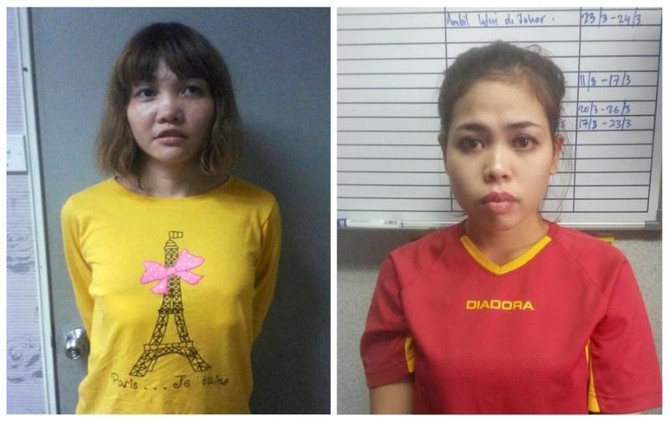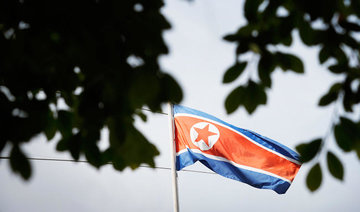KUALA LUMPUR: Two women accused of killing the estranged half-brother of North Korea’s leader at the Kuala Lumpur international airport are expected to plead not guilty when their trial begins at a Malaysian court on Monday.
Indonesian Siti Aisyah, 25, and Doan Thi Huong, 28, from Vietnam, are charged with murdering Kim Jong Nam at the airport on February 13 by smearing his face with VX, a chemical the UN describes as a weapon of mass destruction.
The pair, however, have told their lawyers they did not know they were participating in a deadly attack and believed they were carrying out a prank for a reality TV show. They face the death penalty if convicted.
“They (the women) will maintain their innocence,” Hisyam Teh, Huong’s lawyer, told Reuters.
Monday’s much-anticipated trial is expected to run until November 30 at the Shah Alam High Court on the outskirts of the Malaysian capital.
Lead prosecutor Muhamad Iskandar Ahmad declined to comment on details of the case, but said between 30 and 40 witnesses, including 10 experts, would be called to testify.
The prosecution is expected to call expert witnesses such as pathologists and chemists early on, Hisyam said.
He declined to comment on the defense’s strategy, but said Huong was in good hands.
“She (Huong) has a good defense and we have the evidence to support it,” he said, without elaborating.
South Korean and US officials have said that Kim Jong Un’s regime was behind the murder.
Kim Jong Nam, who was living in exile in Macau, had criticized his family’s dynastic rule of North Korea and his brother had issued a standing order for his execution, according to some South Korean lawmakers.
Four other people, who have not been apprehended or named, have been charged along with Siti Aisyah and Huong. Four North Koreans, who police named as suspects in the case, left Kuala Lumpur for Pyongyang on the day of the killing.
An Interpol red notice, an international alert just short of an arrest warrant, has been issued for the four, who were caught on airport CCTV cameras observing the murder, police said.
Naran Singh, who is also on Huong’s defense team, has asked prosecutors to release the names of the four suspects charged with the women.
Gooi Soon Seng, Siti Aisyah’s lawyer, did not respond to an e-mailed request for comment. He has previously said the presence of other suspects would change the case completely.
“We believe the main suspects are the four North Koreans that have left the country. If we were able to arrest them, everything would be as clear as daylight,” Gooi told reporters after a pre-trial hearing in July.
The once cozy ties between Malaysia and North Korea have been frayed after North Korea questioned Malaysia’s handling of the investigation into Kim Jong Nam’s murder.
The Malaysian government expelled the North Korean ambassador. In response, Pyongyang barred all Malaysians from leaving the country. Malaysia only secured their release in exchange for returning Kim Jong Nam’s body to North Korea and safe passage home for three North Korean men wanted for questioning in the case.
Malaysia on Thursday banned its citizens from traveling to North Korea, citing security concerns from Pyongyang’s nuclear tests. The travel ban follows a visit earlier this month to Washington by Prime Minister Najib Razak, who told US President Donald Trump Malaysia has stopped doing business with North Korea, in line with UN sanctions.
North Korea is not a member of Interpol, and Pyongyang was unlikely to entertain any request from Malaysia to return the suspects in the absence of an extradition treaty between the two countries, said Ahmad Martadha Mohamed, an associate professor at Universiti Utara Malaysia.
“Indirectly, this will make it very difficult for Malaysia to put any pressure on North Korea to send the suspects back,” he said.


Women to plead not guilty in high-profile Kim Jong Nam murder trial
Women to plead not guilty in high-profile Kim Jong Nam murder trial

Court records raise doubts that ICE is detaining the ‘worst of the worst’ in Maine

- Federal officials say more than 100 people have been detained statewide enforcement ‘Operation Catch of the Day’
- ICE has said the operation is targeting about 1,400 immigrants in a state of about 1.4 million people
PORTLAND, Maine: Immigration and Customs Enforcement has highlighted the detention of people whom it called some of Maine’s most dangerous criminals during operations this past week, but court records paint a more complicated picture.
Federal officials say more than 100 people have been detained statewide in what ICE dubbed “Operation Catch of the Day,” a reference to the fishing industry. ICE said in a statement that it was arresting the “worst of the worst,” including “child abusers and hostage takers.”
Court records show some were violent felons. But they also show other detainees with unresolved immigration proceedings or who were arrested but never convicted of a crime.
Immigration attorneys and local officials say similar concerns have surfaced in other cities where ICE has conducted enforcement surges and many of those targeted lacked criminal records.
One case highlighted by ICE that involves serious felony offenses and criminal convictions is that of Sudan native Dominic Ali. ICE said Ali was convicted of false imprisonment, aggravated assault, assault, obstructing justice and violating a protective order.
Court records show Ali was convicted in 2004 of violating a protective order and in 2008 of second-degree assault, false imprisonment and obstructing the reporting of a crime. In the latter case, prosecutors said he threw his girlfriend to the floor of her New Hampshire apartment, kicked her and broke her collarbone.
“His conduct amounted to nothing less than torture,” Judge James Barry said in 2009 before sentencing Ali to five to 10 years in prison.
Ali was later paroled to ICE custody, and in 2013 an immigration judge ordered his removal. No further information was available from the Executive Office for Immigration Review, and it remains unclear what happened after that order.
Other cases were more nuanced, like that of Elmara Correia, an Angola native whom ICE highlighted in its public promotion of the operation, saying she was “arrested previously for endangering the welfare of a child.”
Maine court records show someone with that name was charged in 2023 with violating a law related to learner’s permits for new drivers, a case that was later dismissed.
Correia filed a petition Wednesday challenging her detention, and a judge issued a temporary emergency order barring authorities from transferring her from Massachusetts, where she is being held. Her attorney said she entered the United States legally on a student visa about eight years ago and has never been subject to expedited removal proceedings.
“Was she found not guilty, or are we just going to be satisfied that she was arrested?” Portland Mayor Mark Dion said during a news conference in which he raised concerns that ICE failed to distinguish between arrests and convictions or explain whether sentences were served.
Dion also pointed to another person named in the release: Dany Lopez-Cortez, whom ICE said is a “criminal illegal alien” from Guatemala who was convicted of operating under the influence.
ICE highlighted Lopez-Cortez’s case among a small group of examples it said reflected the types of arrests made during the operation. Dion questioned whether an operating-under-the-influence conviction, a serious offense but one commonly seen in Maine, should rise to the level of ICE’s “worst of the worst” public narrative.
Boston immigration attorney Caitlyn Burgess said her office filed habeas petitions Thursday on behalf of four clients who were detained in Maine and transferred to Massachusetts.
The most serious charge any of them faced was driving without a license, Burgess said, and all had pending immigration court cases or applications.
“Habeas petitions are often the only tool available to stop rapid transfers that sever access to counsel and disrupt pending immigration proceedings,” she said.
Attorney Samantha McHugh said she filed five habeas petitions on behalf of Maine detainees Thursday and expected to file three more soon.
“None of these individuals have any criminal record,” said McHugh, who is representing a total of eight detainees. “They were simply at work, eating lunch, when unmarked vehicles arrived and immigration agents trespassed on private property to detain them.”
Federal court records show that immigration cases involving criminal convictions can remain unresolved or be revisited years later.
Another whose mug shot was included in materials on “the worst of the worst” of those detained in Maine is Ambessa Berhe.
Berhe was convicted of cocaine possession and assaulting a police officer in 1996 and cocaine possession in 2003.
In 2006 a federal appeals court in Boston vacated a removal order for him and sent the case back to the Board of Immigration Appeals for further consideration.
According to the ruling, Berhe was born in Ethiopia and later taken to Sudan by his adoptive parents. The family was admitted to the United States as refugees in 1987, when he was about 9.
ICE has said the operation is targeting about 1,400 immigrants in a state of about 1.4 million people, roughly four percent of whom are foreign-born.
Federal officials say more than 100 people have been detained statewide in what ICE dubbed “Operation Catch of the Day,” a reference to the fishing industry. ICE said in a statement that it was arresting the “worst of the worst,” including “child abusers and hostage takers.”
Court records show some were violent felons. But they also show other detainees with unresolved immigration proceedings or who were arrested but never convicted of a crime.
Immigration attorneys and local officials say similar concerns have surfaced in other cities where ICE has conducted enforcement surges and many of those targeted lacked criminal records.
One case highlighted by ICE that involves serious felony offenses and criminal convictions is that of Sudan native Dominic Ali. ICE said Ali was convicted of false imprisonment, aggravated assault, assault, obstructing justice and violating a protective order.
Court records show Ali was convicted in 2004 of violating a protective order and in 2008 of second-degree assault, false imprisonment and obstructing the reporting of a crime. In the latter case, prosecutors said he threw his girlfriend to the floor of her New Hampshire apartment, kicked her and broke her collarbone.
“His conduct amounted to nothing less than torture,” Judge James Barry said in 2009 before sentencing Ali to five to 10 years in prison.
Ali was later paroled to ICE custody, and in 2013 an immigration judge ordered his removal. No further information was available from the Executive Office for Immigration Review, and it remains unclear what happened after that order.
Other cases were more nuanced, like that of Elmara Correia, an Angola native whom ICE highlighted in its public promotion of the operation, saying she was “arrested previously for endangering the welfare of a child.”
Maine court records show someone with that name was charged in 2023 with violating a law related to learner’s permits for new drivers, a case that was later dismissed.
Correia filed a petition Wednesday challenging her detention, and a judge issued a temporary emergency order barring authorities from transferring her from Massachusetts, where she is being held. Her attorney said she entered the United States legally on a student visa about eight years ago and has never been subject to expedited removal proceedings.
“Was she found not guilty, or are we just going to be satisfied that she was arrested?” Portland Mayor Mark Dion said during a news conference in which he raised concerns that ICE failed to distinguish between arrests and convictions or explain whether sentences were served.
Dion also pointed to another person named in the release: Dany Lopez-Cortez, whom ICE said is a “criminal illegal alien” from Guatemala who was convicted of operating under the influence.
ICE highlighted Lopez-Cortez’s case among a small group of examples it said reflected the types of arrests made during the operation. Dion questioned whether an operating-under-the-influence conviction, a serious offense but one commonly seen in Maine, should rise to the level of ICE’s “worst of the worst” public narrative.
Boston immigration attorney Caitlyn Burgess said her office filed habeas petitions Thursday on behalf of four clients who were detained in Maine and transferred to Massachusetts.
The most serious charge any of them faced was driving without a license, Burgess said, and all had pending immigration court cases or applications.
“Habeas petitions are often the only tool available to stop rapid transfers that sever access to counsel and disrupt pending immigration proceedings,” she said.
Attorney Samantha McHugh said she filed five habeas petitions on behalf of Maine detainees Thursday and expected to file three more soon.
“None of these individuals have any criminal record,” said McHugh, who is representing a total of eight detainees. “They were simply at work, eating lunch, when unmarked vehicles arrived and immigration agents trespassed on private property to detain them.”
Federal court records show that immigration cases involving criminal convictions can remain unresolved or be revisited years later.
Another whose mug shot was included in materials on “the worst of the worst” of those detained in Maine is Ambessa Berhe.
Berhe was convicted of cocaine possession and assaulting a police officer in 1996 and cocaine possession in 2003.
In 2006 a federal appeals court in Boston vacated a removal order for him and sent the case back to the Board of Immigration Appeals for further consideration.
According to the ruling, Berhe was born in Ethiopia and later taken to Sudan by his adoptive parents. The family was admitted to the United States as refugees in 1987, when he was about 9.
ICE has said the operation is targeting about 1,400 immigrants in a state of about 1.4 million people, roughly four percent of whom are foreign-born.
© 2026 SAUDI RESEARCH & PUBLISHING COMPANY, All Rights Reserved And subject to Terms of Use Agreement.












